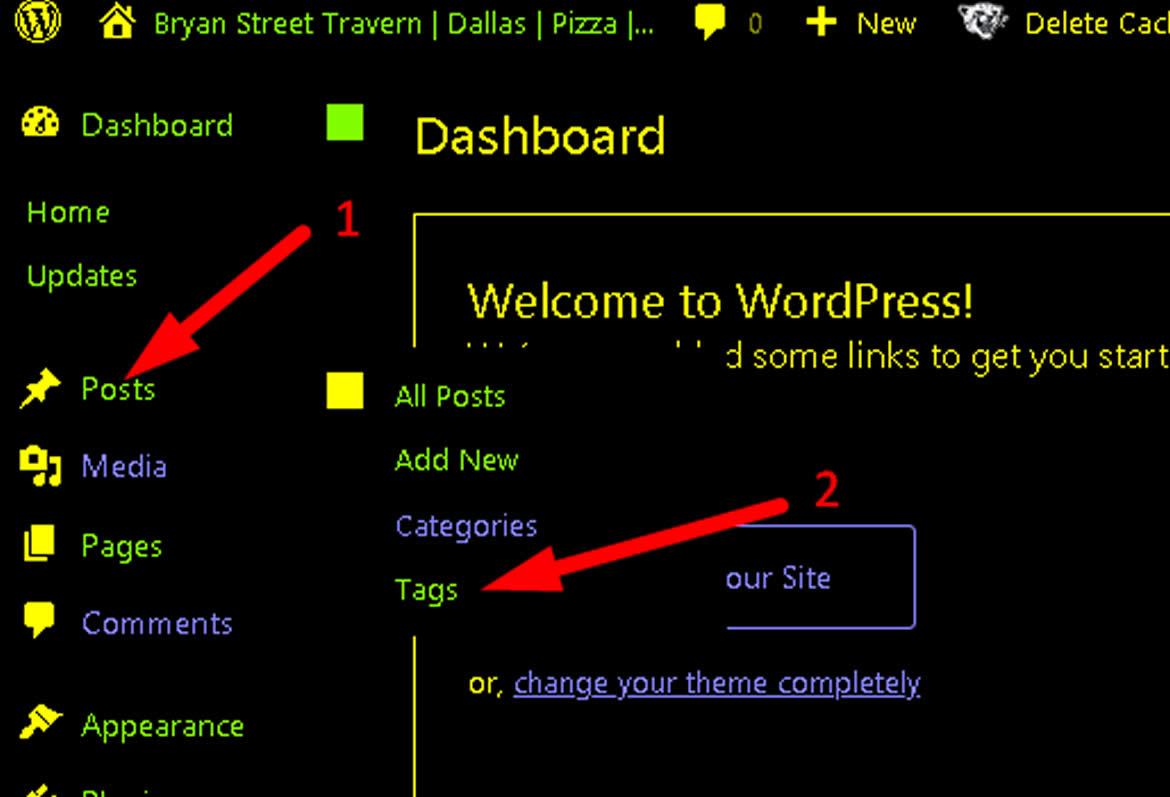Do WordPress tags help
SEO? (HINT: Nope & this is better)

Here is my first and only advice if you are wondering WordPress tags help SEO, "nope, they don't help and you should never use them for SEO, period."
Look, if you are not a professional WordPress developer or an SEO expert with more than 15 years of experience, you need to stop using these WordPress tags forever.
Just don’t use them at all because they are useless most of the time and they don't do anything good to your SEO.
WordPress tags should only be used for organizational purposes and only when you are planning to have a super big website with thousands and thousands of pages that need to be organized.
But even then, you need to know that WordPress websites can be organized in many other ways, perhaps better than using tags.
Nevertheless my recommendation at the end and in in most cases is always the same, don’t use the WordPress tags and never for SEO.
Block tags if you want them
Now in the case you want to use them at least hidden them or blocked them from the search engines with the meta robot tags “no-index” and “no-follow”.
That way you won’t affect your SEO efforts.

NOTE: to block tags you can either use a WordPress plugin or modify your WordPress theme settings which usually involves changing your PHP, so contact a professional WordPress developer for help.
Are WordPress tags really bad for SEO?
Well in reality, they are not really that bad but they don't do any good at all either.
The only thing that WordPress tags will be doing for your website is creating pages that will be worthless for your SEO power.
SEO power is usually measured by DA and PA which are similar metrics to what Google Page rank was years ago.
The more tags you have, the more pages your WordPress site will create for the search engines.
As a consequence your SEO power will be distributed to all these worthless pages that in many cases won't drive any SEO traffic at all.
Now, there might be a couple scenarios where you can properly use WordPress tags to gain SEO power and drive more traffic.
But that usually requires from you to be a very good SEO and WordPress expert which that is rarely the case for most people.
If you really want to increase your SEO power and your online traffic which is the reason of SEO, you should focus your attention on developing content based on things people are looking online aka "keywords".
For instance, let me show the simple formula I use all the time to grow my websites to the 50,000 visitors per month and beyond.
Growing your traffic with SEO is easy but please don't use WordPress tags, never ever, period
Keep in mind that with this SEO formula, you won't have any limits.
Look, if you want to grow your websites to the 50K or even to the 100K visitors per month that will be possible.
Just follow the formula and then rinse and repeat to keep growing indefinitely.
The key is to just duplicate it as many times as you want.
That's it very simple.
So here it is, the SEO formula I always use.
Tree steps SEO formula to increase your traffic
Step 1) Find keywords with high traffic and low competition.
Step 2) Analyze the SERPs to know what type of content Google is incentivizing.
Step 3) Based on the keywords and the SERPs analysis, create your own content.
TIP: Make sure you honestly try to help the reader and also learn how create good CTAs around your content for good conversions. (CTA meaning call to action)
SIDE NOTE: I have been using this SEO formula since 2008 which is ridiculously old and the changes since then have been pretty much non existent.
Seeing the SEO formula in action
If you actually analyze this blog post, I used that exact formula to position myself at the top of Google.
You are here because you most likely searched in Google one of the following words.
- Do WordPress tags help SEO
- WordPress tags SEO
- Do WordPress tags affect SEO
- Are WordPress Tags Important For SEO?
If you notice, all those are keywords I found after my research from step #1 of the formula.
SIDE NOTE: A keyword research will tell you how much traffic and how much competition a keyword will have.
Big traffic and low competition is always the sweet spot.
In this case and for me the winner keyword was, "Do WordPress tags help SEO", which is the reason I use it inside my title.
Then after I got the right keyword, I then proceeded to step #2 which is search it on Google and analyze the Google result pages aka SERPs.
In this case I analyzed what the other websites where writing about and that's from where I got more ideas to create this content which is part of the final step #3.
Keep in mind that creating content can include, text, images, videos, PDF files, infographs, etc. etc.
That's why it is important you analyze the SERPs because that will tell you what Google will like to see on the results which is also another way to know what users will be expect to see when searching for that golden keyword you found inside step #1.
And that's it.
That is the power of SEO and the main reason why many businesses grow online and attract more traffic, get more leads, more sales, and ultimately reach their goals.
See? There are no secrets here and the best of all is that this has not changed since 2008.
If you want to grow your website, you need to master SEO and learn exactly how to do it.
Become an SEO master in 30 days
Now, you need to know that SEO is extensive and you can find lots of information out there.
However one of the fastest way for learning this craft is by working directly with an SEO expert because there is no match for that.
When you work and have the support of someone who has been doing this for over 15 years, your learning time is reduced exponentially which saves you a lot of time and money in the long run.
Here at Supfort, we run special SEO classes in Dallas where we teach how to master SEO in just matter of weeks and not years.
If you are interested in growing your websites with SEO, I invite you to apply for my one on one SEO bootcamp by just visiting this link
In there we can discuss more about why learning SEO is really important and we can discuss more details about the bootcamp.
Keep in mind that you don't necessarily need to live in Dallas Texas as we have many students around the world learning SEO with us, so go ahead and apply on this link if you are interested.
For the moment that's all for this post and below, if you still need more information, please read the SEO WordPress FAQs section or send me your comments.
SEO WordPress FAQ
1) What do tags do on WordPress?
WordPress tags only have two functions.
One is for organizing and putting content together from the same subject.
And two is for giving the user a better experience when looking for related content.
2) How do I see all tags in WordPress?
To see all of your current WordPress tags go to Posts > Tags (see image below).
If you don't see any tags there, you might have none or you might be using a modified WordPress system that might have modified the tags location.

3) What's the difference between tags and categories in WordPress?
Personally I don't see any difference between tags and categories in WordPress.
Both of them help you to organize content and increase the user experience inside this CMS system.
For some people categories might be more important categories but for me both can be used in the same way.
4) Should you use tags in WordPress?
Nope, run away from them, really never use them.
If you end up using them, make sure you block the pages created by these WordPress tags./p>
You need to blocked them from the search engines, so they don't crawl them.
You can use the plugin All in One SEO to use "no-index" and "no-follow".
5) How many tags should I use on WordPress?
Exactly zero, none, nada, zip. :)
6) What is the best SEO plugin for WordPress?
If you are a WordPress and an SEO expert like me, then you should know plugins are not needed for SEO within WordPress.
I don't care what other experts say.
The reality is when you know what you are doing, you will realize that plugins are barely needed if ever.
The only plugin you might end up using is a sitemap generator, but there is always a turn around for everything.
Trust me don't go crazy with plugins, I have been doing this for a long time and I see more than the average Joe out there.
7) Should I use categories or tags in WordPress?
I will say always choose categories over tags but that can depend.
At the end if you are using these two options for your blogs, I will say use either.
But make sure you block both category and tag pages from the search engines.
Yes block them and yes both of them.
8) What is the best free SEO plugin for WordPress?
Stop using plugins for SEO inside WordPress, trust me they are worthless.
The problem here is that most people using WordPress, no offense :), they are below amateurish level.
The only plugin you might have to use with WordPress is perhaps a sitemap generator and that's it.
And I know I am not making friends with this statement of not using SEO plugins inside WordPress but I have been saying this since 2008, so my position is not new.
If you want to use SEO plugins no matter what, then stick to Yoast SEO and All in One SEO.
9) Does WordPress need SEO Plugin?
No if you know what your are doing with WordPress and with SEO.
Unfortunately 95% of the people have no clue how to get around WordPress or SEO, so they always end up using plugins.
10) Should I use Yoast for WordPress SEO?
Nope, never ever use it or any other SEO plugin for that matter. :)
11) How do I improve my SEO score on WordPress?
Use my three steps SEO formula I shared with you and keep publishing content.
Just do that for 6 months and trust me your SEO will skyrocket like wildfire.
Now you can do many more things but SEO work should be always simplified.
Many people will tell you that links will be very important for your SEO, but nope.
Links are not important the way I use and teach SEO.
If someone tells you links is all that you need.
Run away from that person.
Trust me I have rank many websites many times over by using pure On-Page SEO and with zero links.
12) How long does SEO takes to work in WordPress?
SEO works the same way inside any CMS system and WordPress is not the exception.
If you follow my three steps SEO formula, you will be getting results in 1 to 3 months.
But expect everything to kick in in the 6 month.
13) Is Yoast SEO Premium for WordPress worth it?
Nope, next question please.
14) Which is better for SEO pages or posts?
If you are using WordPress for blogging use posts.
If you are using WordPress for business use pages.
But in reality you can use both for the same exact thing, the point is do you know how do it?
Most WordPress and SEO experts should know this.

